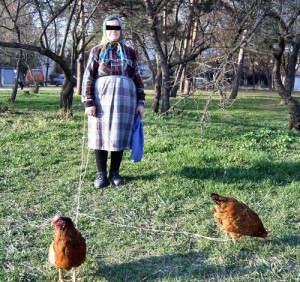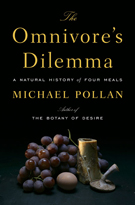Organic America
 This whole organic food concept cracks me up sometimes. There is a multi-billion industry built on it. The modern American culture became so “fat hydrogenated” that produced a whole anti-movement (rightly so) to bring back the original food production standards of natural cooking.
This whole organic food concept cracks me up sometimes. There is a multi-billion industry built on it. The modern American culture became so “fat hydrogenated” that produced a whole anti-movement (rightly so) to bring back the original food production standards of natural cooking.
Food Ratios
I grew up 33 years in Romania, an East European country with a struggling economy (and folks I mean in crutches), and rigorous food restrictions. Communism made everyone eat “light” but not as in healthy but as in “less” since food stores were literally empty. We had to go through food ratios, for example one family of four people had access to 4 liters of vegetable (sun flower) oil, 4 kg flour, and 2 kilos of sugar per MONTH. In fact, that’s not bad at all! Talk about eating healthy!
The Alternative
Each city-habitant family was forced in a way to cultivate its own food in their backyard. That meant each little piece of land was transformed into a productive beautiful garden. People there were growing everything from tomatoes, eggplants, onions, potatoes, corn, etc., to apple trees, cherries, grapes, apricots, pears, peaches, and so on. And if by any chance there was something you missed in your garden, it only took an early morning trip (by foot!) to the farmer’s market to find it!
And not only vegetables and fruits, but all families had their little micro-farm in their backyard. Everyone had at least 5-10 chicken that happily were laying fresh eggs each morning, as some of the lucky ones had 2-3 pigs as well!
So, on family could in fact live off their small land! Remember this is talking about living in a city, not in rural areas. And boy, those tomatoes were delicious, those cherries were FULL of flavor, the eggs had plumpy bright orange colored yolks.
The concept of “organic food” was not even known, people just used to eat that way. I miss that.
Organic World
It is funny for me to go to certain farm museums here. The displays are showing “old” ways of living and farming that I grew up with and are actually practiced in 2/3rd of the rest of the World currently!
We have a nature preserve close to our home in Chicago, where there is a little cute German style settler’s home, garnished with all the original household furniture, wood burning stove, sewing machine, a vegetable garden (all organic of course), fruit trees, chicken, horses, etc., and with little old ladies walking around dressed up in the era’s style, explaining to curious visitors how to shear a sheep, or to make bread, etc.
I go – “Heck! I’ve being doing that for the last 33 years of my life! Am I that old?!?”
The Organic “Hype”
As cliche as it sounds, there isn’t anything new under the sun. What’s the big deal? The return to the organic cuisine should not be celebrates as as a novelty but as something that was always there to begin with.
It is a natural refuge to run to from America’s eating disorder.
Fortunately there are movements that are raising awareness on this issues, the most prominent being The Slow Food Movement started as a response to the fast food invasion (read McDonalds) in Italy. They provide key mission objectives to name a few:
- promotion and preservation of traditional and local food products, including their preparation techniques
- taste education
- consumer education about the risk of fast food
- gardening skills education to students and prisoners
- lobbying against pesticides
- encouraging local marketplace ethical trade
- forming seed banks to preserve heirloom species
- developing various programs to preserve family farms
 In addition, a must read, Michael Pollan’s book The Omnivore’s Dilemma has a fascinating eye-opening insight in how America’s food industry is dictating how we eat, and how choosing what we eat can create serious economic, health, social, environmental and moral issues.
In addition, a must read, Michael Pollan’s book The Omnivore’s Dilemma has a fascinating eye-opening insight in how America’s food industry is dictating how we eat, and how choosing what we eat can create serious economic, health, social, environmental and moral issues.
It is interesting for me, and outsider, US Naturalized Romanian to observe these facts. Coming from the deep non-modern world and being catapulted into the heart of the most developed country and culture on Earth, it is striking to see how a whole movement veers back to the very foundation of an organic living, that was in fact there for ages and 2/3rd of the Planet still functions on it.
I guess I should start looking for places where I can find cow or horse manure to fertilize our little backyard garden, and build a hen pen with at least 5 chicken in our well off Chicago North-West suburb home. I bet I’ll be sued by our neighbors.


 facebook
facebook instagram
instagram twitter
twitter
A fascinating, informative post. Thanks for sharing all of this; it is kind of comical/sad that America strayed so far from organic living to have to come back to it as a novel movement. I really like the blog you have created here. I look forward to coming back!
Thank you Lael!
Gabi @ Mamaliga.com
Gabi, i am a huge Michael Pollan advocate myself (as I am sure you have noticed I advertise his book “In Defense of Food” on my own blog. The “Slow Food Movement” is not a new phenomenon for Greeks, they just called it “eating”. Interestingly, Greece has the strictest agricultural laws of any European country and things like GM crops are verboten in the Greek countryside. Monsanto and several other big bio-engineering companies are currently suing Greece over the fact that the Greek state will not allow the importation and planting of their products in the country despite being ordered to do so by the EU. Here in Canada though, things are pretty much as they are in the US…
Sam –
That’ SO true! Yes – I saw the advertised book. Indeed the “Slow Movement” is an can be popular only in Fast Food America.
So sad to see the EU forcing countries that are last vestiges of how crops should be grown.
Although I really do hope that food will not “speed up” in old Europe as here in the US.
thanks for the comment!
With respect to Greece holding out against Monsanto et al., I suspect Church involvement in the matter (but I am not sure), if that is the case, it will be very hard for Monsanto and Co. to have their way despite EU directives.
Here in Canada I have managed to feed my wife and a couple of neighbors from a backyard garden, but I fear the day when seed giants like Monsanto, who are GMOing seeds as we speak, will have patents on garden veggies and tax even the poorest of the poor this way! We need improved veggies, and i9n my case fruits that grow in my shorter season, but to let the “Crow-Bar Capitalists” that are loose in the ‘states today control the seeds is a frightening prospect!
Awesome post. Calling everything organic is just to pander to the self-absorbed yuppies who wouldn’t know how to put a seed in a dirt pot if you gave them a diagram. The latte drinking, cel phone texting twits who go for any fad diet: south-beach, low-carb, organic.
And the hoops you have to go through to be ‘certified’ organic isn’t worth it for the smaller farmers who actually do it too! It’s too much time and money to meet some ridiculous guidelines.
I feel sorry for those yuppies.
What I think is crazy is people in the suburbs who spend hours tending huge monoculture lawns. I’ve never been without at least a tiny vegetable garden. Even if you let some of it go unharvested at least you are created a more diverse environment. The recent immigrants to this country that I know would never waste good backyard space and not plant a vegetable garden.
My grandmother likes to joke that when she lived on the farm they grew everything organic because they couldn’t afford to do otherwise.
What a fascinating post. Yes the organic movement is silly when you think that other cultures have been living like that for hundreds of years, and we in America act like we invented the idea. My husband and I keep a garden that gets bigger and bigger each year, and hope someday to be able to live off the land (at least with fruits and vegetables – we aren’t allowed to have chickens, etc.).
Haha, what a funny and thoughtful post, Gabi. Very well said in several regards. I have traveled to many places in Eastern Europe (and am in love with the places and people – not to mention the foods!) and have seen the scenes which you’ve described. Though I grew up in Thailand, I happened to live right in the middle of the concrete jungle, so I never farmed or gardened and have always been envious of those who can live simply. However, growing up, we would go to something like a farmers’ market here and buy just enough food for the day. All the vegetables would be freshly plugged off the ground and everything else would be fresh. Then the next day we would go back for more fresh food. The idea of making huge batches of food, freezing them, and heating and reheating them over and over was so foreign to us. Even our refrigerator was small. There was really no need for a bigger one.
Thanks for a great read.
Sam:
Chances are that it is the Orthodox church involvement there. I suspect they have a powerful say in the government.
Uncle B:
Thanks for the comment! That IS a very frightening prospect indeed. It is really like the Evil Empire. Very communistic thinking much alike to the 1984 movie. Control, control. Although I bet they will need to put up a big fight to patent the garden veggies specially now with a rising awareness for naturally grown produce. But as we know it – money has its last say unfortunately.
Junebug:
Thanks for your input! I second you there that it is insanely ridiculous for the small farmer to tweak its farming to become a “Certified Organic”. To the point that the rules were crafted in a way to be impossible to fulfill.
The thing that stuns me is that all over the world there are farmers that do the most “organic” farming, the West ever knew (including those who draft such requirements) – as a normal way of life.
Maggie:
Thanks for the comment!
Your Grandmother speaks great truth! That’s the heart of true organic farming!
Juliet:
Indeed! Really there’s nothing new under the sun as cliche as it sounds. Growing chicken is my dream too – but unfortunately so remote since we live in the NW Chicago suburbs [sigh].
Leela:
Thank so much for the comment! The way you grew up, with having the possibility of getting just the fresh food you need for the day is a beautiful model of how a local market should be sustained!
Those who buy are happy with their freshly picked produce, and the local farmers earn a living and are encouraged to keep their farms GMO free.
You are right about the fridge size!!! Maybe the size of the fridges sold on the market are a direct indicator of how much a community encourages local farming!